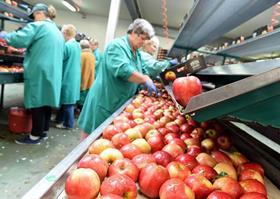
MEP Czesław Adam Siekierski has called on the European Commission to step up its support for producers in his home nation Poland affected by the Russian ban on fruit and vegetable imports, despite the country being accused of grabbing more than its fair share of €125m in emergency funding made available on 18 August.
Poland is the EU's second-largest apple producer after Italy, but relies more heavily on the Russian market when it comes to exports of the fruit.
As a result of the ban, Siekierski told the European Parliament in Strasbourg, around 700,000 tonnes of the fruit normally shipped to Russia are now “stuck” in Poland.
Polish food exports to Russia are worth a total of around €1.13bn per year, he noted. “The crisis is of a political nature - not a storm or force majeure,” he added, calling on the EU to provide greater financial assistance to help growers and farmers.
Outgoing EU Agriculture Commissioner Dacian Cioloş confirmed that the previous support scheme for fresh fruit and vegetables, which had to be abandoned earlier this month due to suspicions over alleged fraudulent claims, would be relaunched soon and managed under the supervision of his successor Phil Hogan.
Measures for peaches and nectarines had already been introduced on 11 August and amount to €32.7m so far, but the concerns are understood to centre around claims made for apples following the release of €125m in new funding on 18 August, of which a maximum of €82m was to be granted to apple and pear suppliers adversely affected by the Russian embargo.
'We will not stop there,' insisted Cioloş, confirming that the new measures for the fruit and vegetable sector were being prepared and should be announced “this week”.
Several Croatian MEPs also complained that citrus producers in their country were not yet eligible for such funding.
However, Greek MEP Miltiadis Kyrkos observed that farmers might not be able to survive while waiting for emergency funding to filter through. Another Greek MEP, Notis Marias, described the original €125m as “peanuts” and not enough to help producers in southern Europe.
The EU exported fruit and vegetables worth a total of €1.07bn to Russia in 2013. That figure is expected to fall dramatically in 2014 as a result of the import ban.






No comments yet